
by Kyla P'an (Portugal) | Mar 4, 2014 | 2014, Awareness, Being Thankful, Education, Human Rights, Humanity, Inspirational, Interviews, Kids, Life Lesson, Motherhood, Older Children, Social Good, Social Media, Technology, USA, Womanhood, World Voice, Younger Children
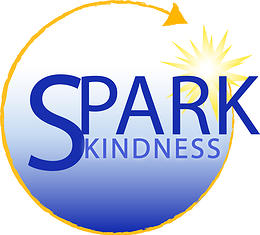 SPARK = Successful, Positive, Authentic, Resilient, Kids
SPARK = Successful, Positive, Authentic, Resilient, Kids
The moment you sit down with Christine Guthery, a funny transformation takes place, you find yourself swelling with optimism, self-confidence and personal-potential. It’s a gift Christine has, she simultaneously exudes these attributes and brings them out in others. She’s passionate about what she does and her enthusiasm has a way of igniting passion in others.
Christine is a lawyer by training but as the mother of three children (now ages 16, 9 and 7), she has discovered that her real calling is as a community activist and SPARK Kindness is community activism at its finest.
SPARK is the offshoot of a coalition called Parents against Bullying and Cyber-Bullying, which Christine founded in 2010, and its sister organization, the Metro-west [Boston] Anti-Bullying Coalition (ABC). The need for an anti-bullying coalition arose from a wide-spread, cyber-bullying incident at a local middle school, which impacted more than 90 students and their families in 2010.
Ironically, though neither Christine nor anyone in her family has ever been a victim of bullying, Christine is on a mission to prevent it. “Bullying is a social justice issue,” Christine says. “in order to rise above it, you have to be resilient, empowered, self-confident. I’m a lawyer by training and this idea of building resiliency inspires me. Everyone deserves to be treated with dignity and respect. That’s my cause.”
“The definition of ‘bully’ used to be pretty straightforward. It was a label once reserved for kids, who were considered outliers or playground thugs, the type of kids who committed physical acts on their victims. But times have changed. Now it’s not just the kids who are insecure or outcast that are doing the bullying, rather it’s also the popular kids, both boys and girls, who are trying to reach the top of their social/athletic/academic pyramid that can be the perpetrators,” Christine says.
“Not too long ago,” Christine continues, “a slanderous note passed around at school could impact a whole class of students or even a school community but when the kids went home at the end of the day, they left the incident at school. Now, with the Internet and smart phones, [and thanks to social media sites like Facebook, MySpace and Instagram,] bullying incidents can enter the cyber-sphere and quickly go viral. Kids have no way of leaving an incident behind them,” explains Christine. “In fact, these days, a great deal of bullying occurs during out-of-school-time.”
Christine believes that genocide and ethnic-cleansing—such as the ones that have occurred in Darfur, South Sudan and Nazi Germany—is “bullying taken to extreme measures.” And it’s really this mindset, this deep desire to eradicate the cause at it’s root, that has given rise to SPARK Kindness. The evolution came in 2012, when Christine realized that just talking about bullying wasn’t making progress.
“For two years [2010 & 2011] I had been focusing on bullying and trying to understand it better,” she says, “but then I realized, what if we shifted the conversation away from the outcome (bullying) and toward the prevention (nurturing kindness and resiliency)? What if our efforts were proactive rather than reactive?”
She compares this shift in mindset with the approach of Western medicine, where the focus is on addressing the illness, not on maintaining and promoting wellness. “I was finding that just talking about bullying was disempowering,” Christine reflects. “When I focused on the positives of resilience, kindness and courage, I felt empowered. It was exactly like the emotion of ‘elevation’ or self-transcendence that psychologist, Jonathan Haidt, described in his 2012 TED talk,” she says. “In other words, when you witness someone doing something positive or altruistic, it inspires you to do something positive or altruistic. This is where SPARK Kindness came from, how can we build the community we want rather than just address the ills we want to avoid?”
The answer:
teach children not just about kindness and emotional self-awareness early on but how to be resilient and seek support when they are feeling insecure or are suffering. SPARK Kindness, ignite positive change in your community.
 To find out ways to SPARK Kindness in your own community, click the logo above or visit http://www.sparkkindness.org/.
To find out ways to SPARK Kindness in your own community, click the logo above or visit http://www.sparkkindness.org/.
This post summarizes an interview between SPARK Kindness founder, Christine Guthery and World Moms Blog Managing Editor, Kyla P’an. This is a World Moms Blog exclusive interview.
Kyla was born in suburban Philadelphia but spent most of her time growing up in New England. She took her first big, solo-trip at age 14, when she traveled to visit a friend on a small Greek island. Since then, travels have included: three months on the European rails, three years studying and working in Japan, and nine months taking the slow route back from Japan to the US when she was done. In addition to her work as Managing Editor of World Moms Network, Kyla is a freelance writer, copy editor, recovering triathlete and occasional blogger. Until recently, she and her husband resided outside of Boston, Massachusetts, where they were raising two spunky kids, two frisky cats, a snail, a fish and a snake. They now live outside of Lisbon, Portugal with two spunky teens and three frisky cats. You can read more about Kyla’s outlook on the world and parenting on her personal blogs, Growing Muses And Muses Where We Go
More Posts - Website
Follow Me:

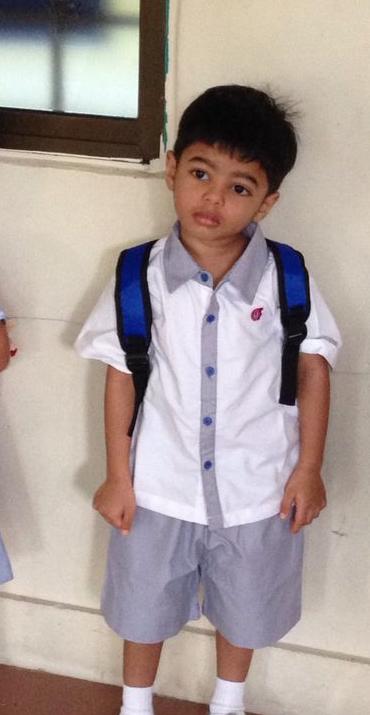
by Veena Davis (Singapore) | Feb 27, 2014 | 2014, School, Singapore, World Motherhood, Younger Children
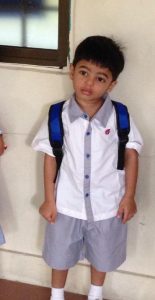 My Little One started school during the New Year, and it was with great trepidation that we approached his impending education. And this was for many reasons…
My Little One started school during the New Year, and it was with great trepidation that we approached his impending education. And this was for many reasons…
For one thing, he knew no other language but our native tongue. And we were very concerned about how he’d interact in school. In fact, we were more concerned about how the teacher could understand him as there was no one who spoke or wrote the language at his school.
Second, this was truly his first foray into the outside world. He has lived a very sheltered 4 years, and was always at home with nearly no interaction with peers of his own age. This wasn’t intentional, rather, it just happened that everywhere we lived, the kids were always much bigger than him; and, he was also very shy.
Third, was for ourselves. We really had no clue on how to go about educating a little child. Both of us remember our mothers teaching us, but that was when we were much older. How does one go about getting a 4 year old to hold his pencil and learn the alphabet? What does one do when he says he wants to play now and study later? Do we force him to learn, or just let it go?
Despite our misgivings, our son started school on Jan 2nd, and the first day went okay. The school permitted parents to sit with kids on the first day, and we had a nice time watching the proceedings. The second day was when the waterworks started, and that lasted till last week.
Every morning, he’d wake up even before the alarm, and ask me if it was time for school. It is heart-wrenching to hear that plaintive tone in his voice…but as advised by many, we were not taking no for an answer. Come rain or shine, he had to go to school.
Then came the homework – for the first time, he had to write “A,B,C”, and we weren’t really sure how to tackle it either. Since neither my husband, nor I, were too endowed in the patience department, we didn’t have such a great time these past 2 months. Most days were filled with screams and cries as we forced the little thing to hold his pencil and write. And you know the funny thing – after we had screamed at him for inverting his Bs or not getting the right slant for his As, he would come up to us after an hour or so, and write a perfect A and B.
I know, we were horrible to him – and our only excuse is that we didn’t want to appear to be too lenient and that he get the impression that it was okay not to want to learn. And I don’t know if it was the terror of the home classes that made it doubly difficult for him to adjust to school, where everything was foreign to him.
You see, we feel like we are living a race now – once we get back home after work, we just have time for a bath and to eat, as Little One must be in bed atleast by 10, so that he wakes up fresh at 7 the next day for school.
But two weeks ago, we made the decision not to pressure him so much – because we were also distressed on seeing his pitiful face every time he had to learn something. We decided that any homework would be finished off speedily by holding his hand and helping him write it, while learning it would be done during the weekends, when there was no pressure on any one.
And I don’t know if it was this decision, or as Little One has made friends and adjusted to school – but since last week, he hasn’t cried at all when going to school. He seems more happy about school, and he keeps singing songs they sing in school. He tells me about the kids in his class (he is already interested in girls) and what he ate and the general happenings in school.
And the atmosphere at home is also different now, with him being happy about school and life in general feels so much more lighter and happier. The lesson I’ve learned from the school fiasco is not to pressurise kids so much that they lose all zest for life. His sad face, and moping around all evening was so depressing, and frankly, I was dreading the years up ahead.
After all, he is just 4 years old, and he is a bright little spark. Let him have his fun and the learning will come slowly.
Have you ever faced a situation like this? What do you do to get your kids to study?
Veena has experienced living in different climes of Asia - born and brought up in the hot Middle East, and a native of India from the state known as God’s Own Country, she is currently based in the tropical city-state of Singapore. ⠀ ⠀ ⠀ ⠀ ⠀ ⠀ ⠀ ⠀ ⠀ ⠀ ⠀ ⠀ ⠀ ⠀ ⠀ ⠀ ⠀ ⠀ ⠀ ⠀ Several years ago, she came across World Moms Network (then World Moms Blog) soon after its launch, and was thrilled to become a contributor. She has a 11-year old son and a quadragenarian husband (although their ages might be inversed to see how they are with each other sometimes). ⠀ ⠀ ⠀ ⠀ ⠀ ⠀ ⠀ ⠀ ⠀ ⠀ ⠀ ⠀ ⠀ ⠀ ⠀ ⠀ ⠀ ⠀ ⠀ ⠀ ⠀ ⠀ ⠀ ⠀ ⠀ ⠀ ⠀ ⠀ ⠀ ⠀ ⠀ ⠀ ⠀ ⠀ ⠀ On a professional front, she works in the financial sector - just till she earns enough to commit to her dream job of full-time bibliophile. ⠀ ⠀ ⠀ ⠀ ⠀ ⠀ ⠀ ⠀ ⠀ ⠀ ⠀ ⠀ ⠀ ⠀ ⠀ ⠀ ⠀ ⠀ ⠀ ⠀ ⠀ ⠀ ⠀ You can also find Veena at her personal blog, Merry Musing. ⠀
More Posts - Website

by Elizabeth Atalay | Feb 25, 2014 | 2014, Communication, Culture, Education, Older Children, Social Good
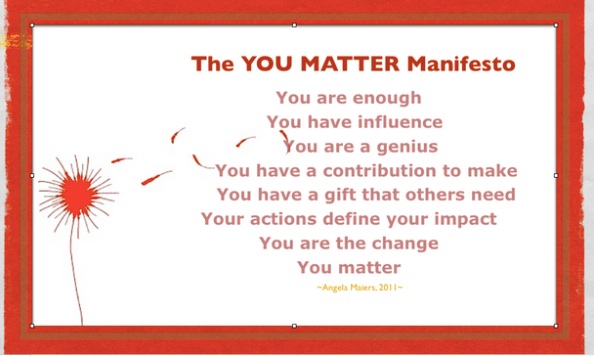
“You Matter”. The revelation that those two words can change the world seems so simple, so intuitive, yet those are not words that young people are used to hearing. Angela Maiers a long time educator, and founder of Choose2Matter decided that those two little words could be revolutionary. With her passion and enthusiasm behind the idea that we each have a unique genius to contribute, it is no wonder that her 2007 TEDx talk went viral. Thus the Choose2Matter movement was born.
“We were created for significance and one of the most dangerous things that can happen to us is the feeling that we don’t matter.”- Angela Maiers
Angela points out that she is not talking about an ego thing, studies show that feeling like you matter is a basic human need. The genius she sees in all of us is each individuals’ ability to problem solve from their own unique personal perspective. What started out as a digital community has now evolved into Choose2Matter Live events at schools across the U.S.A. In my mind perhaps no one needs to hear this more than high school kids who are in the process of self-discovery, so I was thrilled when the two-day Choose2Matter Live workshop came to my daughter’s public high school in Rhode Island.
The first thing the kids learned was the Choose2Matter Manifesto: You are enough, you have influence, you are a genius, you have a contribution to make, you have a gift that others need, your actions define our impact, you are the change, you matter. If they did not believe it before, they were now introduced to the idea that their voices and their actions can help others. The examples shown to this new group of kids of ways in which students have already made an impact through Choose2Matter are remarkable.
Honestly though, who doesn’t need to hear this manifesto? Even as adults the feeling that we matter is essential. This is an ideology that we frequently see first hand here at World Moms Blog, the power of one person, one idea brought to fruition, and how it can positively impact entire communities. Kristyn Zalota launched CleanBirth.org to provide safe birth for mothers in Laos, Alison Fraser started www.mom2momafrica to support the education of women and girls in Tanzania, and the founder of World Moms Blog Jennifer Burden created this global community of mothers from around the world when she couldn’t find what she was searching for online. These are just three examples of the many ways World moms Blog Contributors and Editors are using their passions and voices to make the world a better place. Their accomplishments inspire me to strive to do more in my own life, through their achievements I can see the possibilities when one puts their mind to solving a problem.
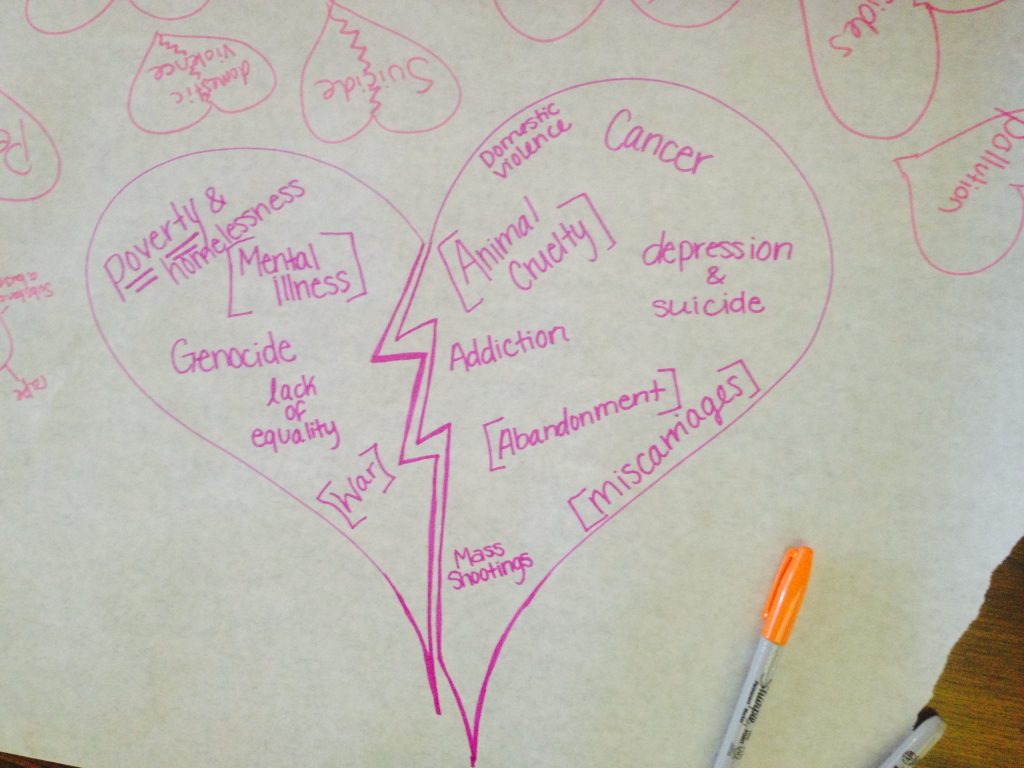
A Heart-Break Map
After the introduction, when the kids broke out into groups of “heart-break mapping” to narrow down what breaks their hearts about the world, and then come up with solutions of what they can do about it, my heart burst open. Kids narrowed down their heart breaks into solvable problems, some chose to be brave about sensitive issues they knew first hand to use their experience to try to help others. Due to a snow-day a room full of high school kids chose to voluntarily return to school on the saturday before vacation week to follow through on their ideas. It was truly amazing to watch these kids come together and talk through some of the major issues impacting society. I witnessed at least three new websites being born to begin to address some of their heart breaks , self-harm, depression, and body image issues for girls. These kids got it. As Angela and her colleague Mark told the kids, these ideas may not be the ones to solve a problem, but you are just building your muscles here, you are just getting started.
The lessons the kids at my daughter’s high school learned in those two days are sure to stay with them. The empowerment of knowing that they do matter, that they are capable of making a difference is huge. The students were left with the message that they are the ones who will need to come up with the answers to the world’s most pressing problems, because us adults just may not have all the answers. (But that is one thing I think all teenagers already seem know.)
This is an original post written for World Moms Blog by Elizabeth Atalay of Documama.
Do you have any great examples of the power of one person who made an impact to share?

Elizabeth Atalay is a Digital Media Producer, Managing Editor at World Moms Network, and a Social Media Manager. She was a 2015 United Nations Foundation Social Good Fellow, and traveled to Ethiopia as an International Reporting Project New Media Fellow to report on newborn health in 2014. On her personal blog, Documama.org, she uses digital media as a new medium for her background as a documentarian. After having worked on Feature Films and Television series for FOX, NBC, MGM, Columbia Pictures, Warner Brothers, 20th Century Fox, and Castle Rock Pictures, she studied documentary filmmaking and anthropology earning a Masters degree in Media Studies from The New School in New York. Since becoming a Digital Media Producer she has worked on social media campaigns for non-profits such as Save The Children, WaterAid, ONE.org, UNICEF, United Nations Foundation, Edesia, World Pulse, American Heart Association, and The Gates Foundation. Her writing has also been featured on ONE.org, Johnson & Johnson’s BabyCenter.com, EnoughProject.org, GaviAlliance.org, and Worldmomsnetwork.com. Elizabeth has traveled to 70 countries around the world, most recently to Haiti with Artisan Business Network to visit artisans in partnership with Macy’s Heart of Haiti line, which provides sustainable income to Haitian artisans. Elizabeth lives in New England with her husband and four children.
More Posts

by Maureen | Feb 19, 2014 | Indonesia, School, Scoops of Joy, World Moms Blog, World Motherhood
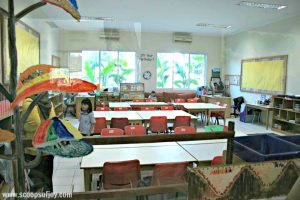
classroom
Ever since my son started school I always have these odd feelings when it comes to socializing with the other moms.
It was my mental block.
Being a single mom, I used to fear about what the other parents will think of me and my boy. The school has been nothing but supportive and treat my boy no differently than his other friends who comes from a whole unit family.
Yes, my boy has his challenges in school.
My beautiful boy, who is a sensitive child, whose mom is quite outgoing, turns out to be shy. He sometimes has difficulty in social settings. It took him awhile to warms up to new situations and surroundings.
Maybe it was growing up alone. I raised him alone with his father without any family help or nanny until he was almost 2 years old. He had no friends around his age to play with until he started school. There were a lot of factors, yet, we are working on this together as a family. Maybe it was being an only grandson for years and having a dotting loving grandma who defends him like he’s a little king?
Yet I know he’s a loving sweet boy with a gentle soul.
When he was in per-Kindergarten and Kindergarten I did not socialize at all with the other parents from his school. Yes, I’d smile and say hi when we met at school’s events or functions but other than that I kept to myself.
I was afraid I would be judged for being a single mom.
I stood awkwardly alone in every single school events while the other kids had both their parents around. Sometimes I felt like I was wearing a big sign on my back that screamed out my status. I hate using the “I’m-a-single-mom” card unless it’s absolutely necessary. The school knew my status from day one, but not many of the other parents have known. They might eventually figure it out.
Now that my son is in the first grade, things are changing.
I have been a single mom for close to 4 years now, and I no longer feel ashamed of being one. I began to relax a bit and not really care about what other people thinks of being a divorcee.
Although I couldn’t be actively involved in school as much as I’d like to due to being a full time working mom, I am so grateful for these awesome homeroom moms.
For special moms who volunteer in school.
Here’s an ode to you lovely homeroom moms:
- Thank you for being our ‘representative’ while we working mom have to work long hours.
- Thank you for being our ‘voices’ to the homeroom teacher, assistant, and even the principal.
- Thank you for passing on to us information that sometimes was missed from the school’s communication book.
- Thank you for coordinating the costumes for our children’s school play.
- Thank you for helping individual kids who sometimes struggle alone and would be missed by the teacher or assistant because they are shy – just like my little boy.
- Thank you for the solidarity in watching and keep an eye on all our children there.
- Thank you for snapping pictures of school events and sharing them with us moms who couldn’t be there.
- Thank you for arranging a car pool.
- Thank you for devoting your time for our children.
- Thank you for being the wonderful ladies that you are.
This year, I am so grateful for these beautiful soul moms who have welcomed me warmly into the group.
Are you a homeroom mom? Are you actively involved in your children’s school?
This is an original post for World Moms Blog by Maureen of Scoops of Joy.
Photo credit to the author.
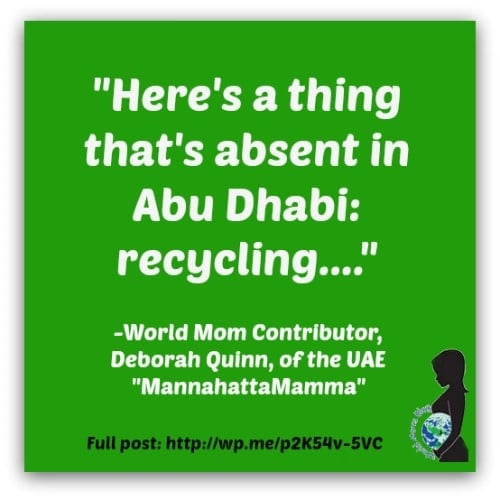
by Mannahattamamma (UAE) | Feb 12, 2014 | 2014, Education, Expat Life, Older Children, UAE, World Motherhood

I turned fifty last month.
See how calmly I said that? Just rolled right off my keyboard with nary a omigodhowdidigetsoold freakout.
Turning fifty in Abu Dhabi, where we’ve lived for the past three years, meant that my family couldn’t be with me to celebrate this milestone (millstone?). On the other hand, celebrating here in a place that still feels quite “new,” reminds me that I’ve avoided one of the big pitfalls of late middle age: falling into a rut. As a wise friend here pointed out to me, when you’ve just upped stakes and settled in a new country, culture, city, you’ve pretty much blown the “rut” wide open.
I’ve gotten used to many new things over our years here–buying Pop-tarts in the “pork room,” Sunday as the start of the work-week, no door-to-door postal service–but there are other things that feel more difficult to resolve, particularly when I think about what my kids are (or aren’t) learning as a result of living here. As with all things, of course, we start to figure out what really matters to us, as parents and as people, when we’re confronted with the absence of that thing.
Here’s a thing that’s absent in Abu Dhabi: recycling. Think about that for a minute, especially those of you who live in the US: think about the fact that it’s become almost second nature to separate your garbage, to flatten the cardboard, take the empty bottles back to the store, to look for products in environmentally-conscious packaging (unless that triples the price in which case…hmm…).
Not here. Oh sure, there are some “recycle” bins in public places, and in the housing development where we live, we have two garbage bins: one for “wet” garbage and one for “dry,” but we’ve watched as both bins get dumped, day after day, into the maw of the same truck. Plastic water bottles are ubiquitous but there isn’t anywhere to recycle them (which will explain why there are about 75 of them under my sink right now–and I think they’re breeding); gas-guzzling SUVs are the norm; and while there is talk about developing solar power here (in the land of eternal sunshine and heat you’d think that would be a no-brainer), nothing as yet has happened.
I use many of these problems as “teaching moments,” trying to explain to my kids about the importance of being environmentally conscious, but it’s been difficult to put anything into action, unlike when we lived in New York, where we took our compost to the farmer’s market to be turned into worm food, separated our trash, and so on.
And then for my birthday, my husband surprised me with two boxes. One was very small and contained things that sparkled. That box was just for me. The other box, much bigger and bulkier, contained a big plastic tub. Much less romantic, perhaps, but a gift for the whole family to–if not enjoy, then at least participate in: Bokashi.
Bokashi is a Japanese word that means fermentation, and bokashi is a method of composting food waste by sprinkling the scraps with “bokashi bran,” which encourages the fermentation process.
All our food scraps (meat, cheese, bread, coffee grounds) go into the bokashi bucket and when the bucket is full, we bury the contents of the bucket in our backyard (although there are other options; see the website for details).
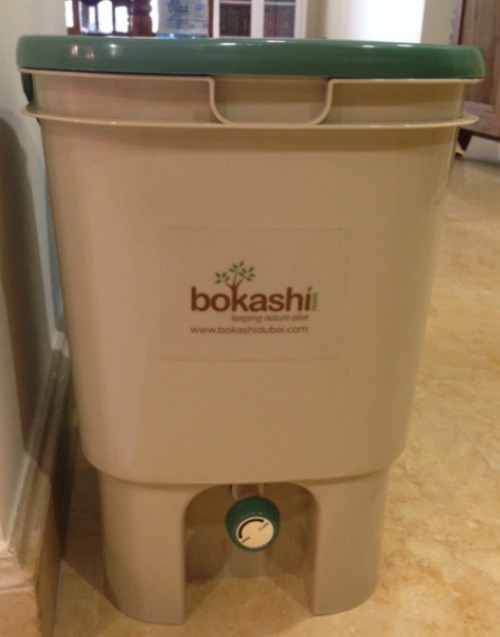
Now my kids have an additional chore: they are the food scrap patrol. Uneaten contents of lunchboxes don’t get dumped at school; they go into the bokashi. Dinner scraps, lunch bits, residue in cooking pots: bokashi, bokashi, bokashi. Not only does composting in this fashion show my boys how much food we throw away and (I hope) make them more mindful about food waste, the process going on inside the bucket is like an ongoing science lesson: molds and other micro-organisms, all right there in the kitchen bucket.
Will this at-home recycling help Abu Dhabi resolve its recycling crisis? Of course not, but at least we are teaching our children (I hope) that everyone can do a small something — and that if enough people do a small something, a Big Something might result. And that’s not a bad lesson –for kids or for fifty year olds.
Is recycling the norm in your country? What do you do to go “green” in your country?
This is an original post to World Moms Blog by Deborah Quinn in the United Arab Emirates of “Mannahattamamma.”
After twenty-plus years in Manhattan, Deborah Quinn and her family moved to Abu Dhabi (in the United Arab Emirates), where she spends a great deal of time driving her sons back and forth to soccer practice. She writes about travel, politics, feminism, education, and the absurdities of living in a place where temperatures regularly go above 110F.
Deborah can also be found on her blog, Mannahattamamma.
More Posts
Follow Me:


by Karyn Wills | Feb 10, 2014 | 2014, Awareness, Being Thankful, Brothers, Childhood, Education, Family, Food, Health, Life Balance, Life Lesson, Milestones, Motherhood, Nature, New Zealand, Nutrition, Older Children, Parenting, Relationships, Traditions, Travel, Vacationing, World Motherhood
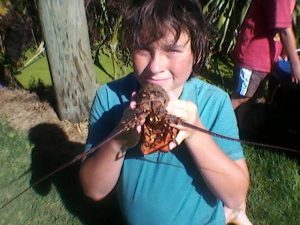 One of my enduring memories of childhood is of trapsing over paddocks, up and down hills, in gumboots too big for my feet picking mushrooms or blackberries. Eventually getting sore heels and aching legs. Eventually filling buckets and ice-cream containers with food.
One of my enduring memories of childhood is of trapsing over paddocks, up and down hills, in gumboots too big for my feet picking mushrooms or blackberries. Eventually getting sore heels and aching legs. Eventually filling buckets and ice-cream containers with food.
Probably scrapping with my sisters. Probably moaning about having to do so. Definitely covered in blackberry juice and scratches on blackberry days. Definitely not impressed by having to pick mushrooms, which I didn’t like to eat.
This summer holiday, my boys got to harvest their own food. Not blackberries and mushrooms, though. They got to harvest seafood.
Tuatua (too-ah-too-ah) are a shellfish. The children love to collect them. We go out at almost low-tide or just after low-tide in thigh-high water. We do the Twist. Our feet sink into the wet sand and feel around for something hard. When we find one, we reach down and pick it up with our hands.
Sometimes, we are side-swiped by a wave. Sometimes, we pick up a round hard sea-biscuit instead. At times, instead of the Tuatua-Twist there is a Crab-Bite-Leap with occasional bad-language. There is almost always laughter and a competition to see who can find the most. This year, the boys and their cousins also took responsibility for collecting fresh seawater twice a day, to keep the Tuatuas in, while they spat out all the sand inside their shells. They kept them cool in the fridge and, when they were finally cooked, the children ate them: some with gusto, others not so much. To me, they taste a bit like chewy seawater…
Our eldest son, 12 year-old Joe, with his 13 year-old girl cousin, Billie, trapped their own crayfish.
Crayfish are related to rock-lobster and, in our extended family, are usually trapped off-shore and by boat, or dived for with scuba-gear and tanks. Joe and Billie had kayaked out around a small peninsula and discovered an old craypot on the rocks. They dragged it out of the sea and managed to convince their fathers to repair it. They then kayaked it out again and dropped it on a good rocky spot.
Each day they went out to check their pot, just as the adults do the other craypots. The first day they caught – seawater. The second day they caught – seawater. The third day they were a bit fed up and otherwise occupied, so didn’t go out. The fourth day or maybe it was the fifth, Billie was out fishing and Joe went out alone to see what was there and to bring the pot in for good. He was very excited to discover they had caught a legal-sized cray! Yes, duly cooked and eaten.
In these days where many children don’t know that carrots grow in the ground or that their meat comes from a real animal, I love that our boys are sometimes involved in the process of food-collection and the processes of preparing it for a meal. I know that these are the Good Old Days and these moments will create some of their childhood memories.
Do your children do similar things you did as a child? Are they involved in collecting or harvesting their own food?
This is an original post to World Moms Blog from our writer in New Zealand and mum of three boys, Karyn Van Der Zwet.
The image used in this post is credited to the author.
Karyn is a teacher, writer and solo mother to three sons. She lives in the sunny wine region of Hawke’s Bay, New Zealand in the city of Napier.
More Posts

 SPARK = Successful, Positive, Authentic, Resilient, Kids
SPARK = Successful, Positive, Authentic, Resilient, Kids To find out ways to SPARK Kindness in your own community, click the logo above or visit http://www.sparkkindness.org/.
To find out ways to SPARK Kindness in your own community, click the logo above or visit http://www.sparkkindness.org/. 


















